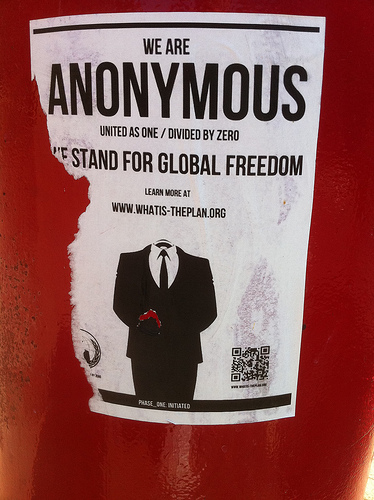Anonymous' weakest link: its members

commentary Anonymous is ideologically a great group, but how it actually performs in the real world leaves something to be desired.

(Anonymous reaches Tunbridge Wells image by Francis Storr, CC BY-SA 2.0)
I like the idea of Anonymous — that if any action is to be taken, it really requires the effort and agreement of all involved and that it doesn't matter if one person is black-bagged or arrested, the movement still goes ahead. It's "the people" talking without any geographical or racial boundaries.
But we don't live in an ideal world.
The Imperva report into a failed Anonymous attack highlighted that even though it received the backing of thousands of followers, the real instigators with arguably any skill were only some 10 to 15 strong. Everyone else? They were along for the ride, without necessarily knowing how to steer or drive. In fact, I often question whether any of the masses have done any research on the argument behind the core group's cause.
Take Interpol, for example. Its website was taken down to revenge the arrests of 25 members of Anonymous. But why Interpol? Interpol doesn't have powers of arrest. Its main function is to provide law enforcement agencies from different countries with the ability to communicate and organise themselves. It's like abusing Australia Post because someone sent you a nasty letter in the mail.
Now let's look at its attacks protesting the Stop Online Piracy Act (SOPA). Most global protests against the Bill weren't really fighting for free movies and software; they were about free speech and securing an open internet. Anonymous' silencing the opposition through distributed denial-of-service attacks went against everything that was fought for.
The worst part is that aside from the core group, a majority of contributors to these attacks didn't hide their tracks or secure their own devices. Not only were they contributing to something that was either ill thought out or simply hypocritical, but they were incompetent. For all intents and purposes, they were cannon fodder, raising the success of the core group and providing ringleaders with safety in numbers.
Yet, strength and unity in its truest sense doesn't come from having thousands of scape goats; it comes from helping each other — making sure everyone is safe and leaving no person behind. And I don't see how this is possible with Anonymous' structure. If CIOs in huge companies can't get their comparatively few and highly valuable employees to learn good security, what hope does Anonymous have with its thousands of followers?